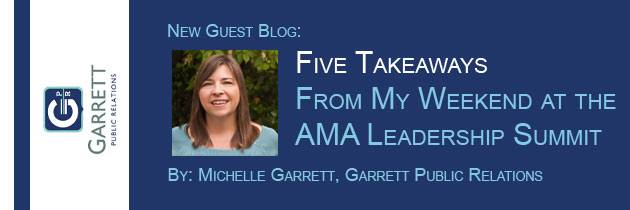
Five Takeaways From My Weekend at the AMA Leadership Summit
I recently had the opportunity to attend the AMA Leadership Summit in Chicago. Along with great networking and the chance to bond with my fellow chapter board members, I learned some things. Here, in no particular order, are my top five takeaways from the summit:
- Don’t skip the prep work for your next presentation—if you’re trying to just “wing it,” it probably won’t go very well. Good presentations don’t just happen – they require lots of preparation. Rehearse and practice, either in front of someone or even just on your own. As our presenter mentioned, he’ll even rehearse in front of his dogs if no one else is available!
- Keep your audience in mind. If you’re trying to reach millennials, a luncheon might not be the best timing for an event. They prefer events after work, so try a happy hour or dinner. And, they don’t want to hear about topics related to social media, which is something they already clearly understand. Try something related to how to move up in their career or maybe a topic about how to better work with the C-suite.
- Don’t overlook the importance of visuals in your presentations. Add compelling visuals to draw attendees’ attention, versus adding more text. Text-heavy slides aren’t as memorable as showing the audience a visual that will stay with them. Then, talk about the topic—you don’t need to include all your points on a slide. We’ve all heard, “A picture speaks a thousand words,” so try incorporating this into your next presentation.
- Don’t be afraid to ask. This is actually one I learned before I went to the summit and shared, because the power of “the ask” is one we sometimes overlook. You won’t know if you don’t ask, so don’t be afraid to reach out, even if it’s a “cold” contact. What’s the worst that can happen? They may so no…if so, you move on. But, they may say yes—then, you have a “win”! Not to mention a new contact.
- When trying something new, be sure you’re building off a solid foundation. That could include having a strong team in place, financial security and some programs that are already working well. For example, if your program is in dire financial straits, it’s not the time to try a risky, expensive new idea. On the other hand, if you have some cash in reserves, it may be a great time to experiment with something you haven’t tried before.





